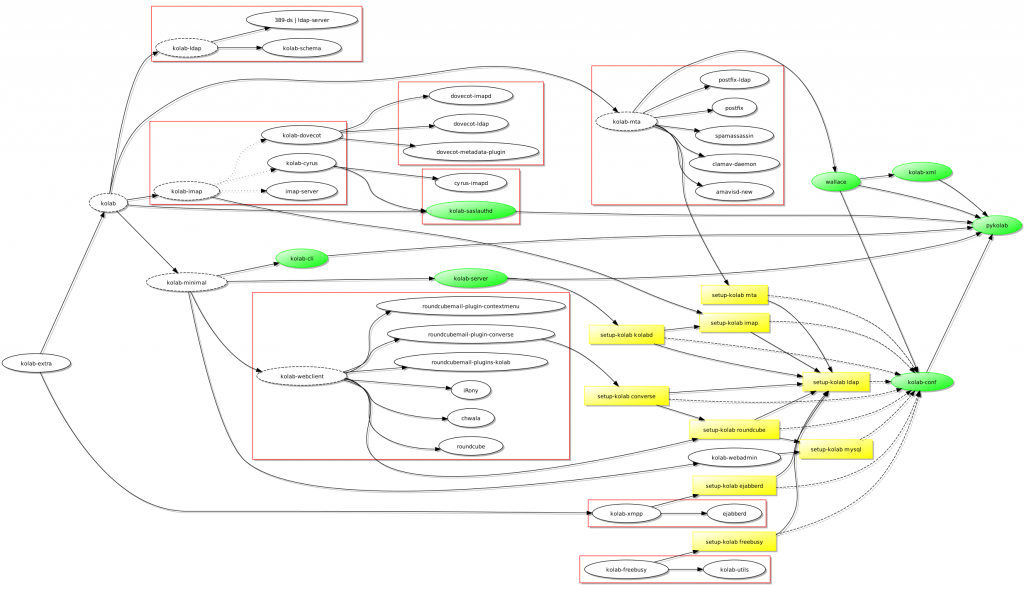Minimal Kolab: Unbundling the LDAP and IMAP Components
Saturday, March 8th, 2014In my last post about Kolab I hinted about unbundling the LDAP server and using a remote server for LDAP service. Since then, I’ve been looking at making the IMAP server an “unbundled” component – IMAP service still being required, of course – and even at supporting Dovecot in setup-kolab as well. After all, choice is an important motivation for adopting Free Software, and we should at least try and make that choice convenient to exercise where possible. Supporting a choice of IMAP servers gives everyone a bit more flexibility and should make Kolab a bit easier to adopt. The Dovecot work is still very much in progress, however.
As you may recall, I wanted to deploy an XMPP server – ejabberd – on one host and the rest of the Kolab stack on another host, and yet retain the possibility of configuring these different components using setup-kolab. To support this specific situation, and to eventually move beyond it to support other architectural configurations, I have chosen to introduce a new metapackage called kolab-minimal: the glue components of Kolab plus the Web components minus the “infrastructure” components, those being the components providing the LDAP, IMAP and mail transport services. Here’s where this takes us:

A dependency diagram for Kolab featuring a kolab-minimal package and the different setup-kolab invocations
If you want to install the complete stack, the kolab metapackage will bring everything you need into the installation and hopefully provide you with a self-contained solution. But now, the kolab metapackage is formulated in terms of the “infrastructure” components plus kolab-minimal. And if you want to install something that gets its services from other computers, kolab-minimal should be all you need.
Obviously, this work deviates from the “official” Kolab packages, but since it appears that those packages aren’t being refreshed with upstream fixes as often as might be desirable, I’ve decided to put some source packages online. If you should be tempted to build them and try them out, please remember to do so in a test environment and that you do so at your own peril! And if you want to track my packaging changes, I’ve put a collection of repositories online, too.
Note that the XMPP dependencies (Converse and ejabberd) are integrated into the above, but more testing is really needed to make sure that they become robust additions. Indeed, as part of the Converse plugin package there’s a patch that fixes an annoying bug that makes deploying the plugin almost like an “all or nothing” affair. So I’ve put them under a new metapackage – kolab-extra – for now.
And the way the packaging invokes the configuration program – setup-kolab – probably needs some review, particularly the way setup-kolab wants to edit or replace configuration files of other packages. Some insights into the proper Debian way of doing this would be very useful indeed. I can imagine Kolab using configuration files in slightly different locations and changing references to where the configuration lives in only one key place (or a few key places), leaving the originals intact, but I haven’t been able to look at this in depth.
And with that, I’ll give my modestly equipped desktop computer a rest from running two User Mode Linux instances and pdebuild in 1GB RAM (of the semiconductor variety, plus some swap).